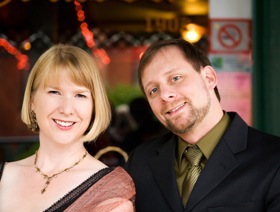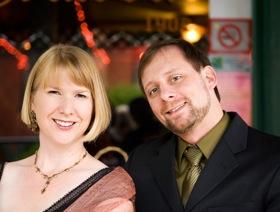Modern listeners can find 14th-century secular music tough to grasp. Working within highly restrictive formal structures, this era’s composers and poets created elaborate ruminations on wide-ranging themes — love, loss, justice, virtue — in a sound world quite distinct from earlier chant or later imitative polyphony.
Live performance of these treasures is all too rare, and to hear them sung by fine singers like those of LIBER (formerly Liber unUsualis) a rarer treat still. In Saturday’s performance at St. John’s Presbyterian Church in Berkeley, this quartet, consisting of soprano Melanie Germond and tenor William Hudson, joined by guest soprano Carrie Henneman Shaw and tenor Jordan Sramek, delivered a performance of intimacy and grace, gently but firmly making a strong case for wider appreciation of this repertory.

tenor William Hudson
Photo by Butterfield Photography
The ensemble’s canny programming placed Italian and French repertory on different halves of the program, accentuating the stylistic differences between Italian melodic floridity and French rhythmic intricacy. Irrespective of nationality, LIBER espoused a refined, delicate performance style that was affecting, yet without a trace of histrionics. Occasional poetry readings by the evening’s poets (Franco Sacchetti, Giovanni Boccaccio, Francesco Petrarca, and Guillaume de Machaut, to name a few) provided fluid transitions between works and served as useful reminders of the poets’ own outstanding skill.
Italian madrigals of this era frame one or two florid upper voices against a slower-moving tenor, quite distinct from their more viscerally expressive 16th-century namesakes. Niccolò da Perugia’s O giustitia regina (O sovereign justice) paired Hudson and Sramek in a well-balanced account of desire for the hasty arrival of righteous retribution, while Lorenzo da Firenze’s setting of Sovra la riva (Upon the bank) found Germond and Shaw masterfully mimicking the poem’s flowing river, with flawless vocal agility.
Fierce Chase
LIBER did equally well with the structurally more complex ballata. Hudson’s warm tenor and keen sense of refinement turned Lorenzo’s Sento d’amor la fiamma (I feel love’s flame) into an eloquent statement on perseverance in winning a woman’s love. Germond, Shaw, and Hudson exploited the long-breathed arches of Francesco Landini’s Per seguir la sperança (In order to follow the hope), a potent expression of hidden desire disturbed only by some uncharacteristic intonation problems. Of three Italian caccia (or “chase”), which feature chasing melodies akin to a modern canon, Niccolò’s La fiera testa (The fierce head) stood out with vibrant moments of back-and-forth exchange.
Turning to France, the ensemble gave due attention to the century’s premier composer-poet, Guillaume de Machaut. The ballade Dame, de qui toute ma joie vient (Lady, from whom all joy I know springs) found all four performers softly and sweetly praising the lady’s virtues. Hudson in particular excelled in the ballade J’aim mieus languir (I prefer to languish), his highly nuanced delivery placed atop Sramek’s equally affecting textless accompaniment.
The remaining French works pushed the repertory forward to the 15th century. In Gilles Binchois’ morose Tristre plaisir (Sad pleasure), Germond’s clarion soprano dovetailed against darker, textless tenor melodies, ably capturing the poem’s bittersweet mood. Shaw offered a lusty contrast in the anonymous Je ne prise point tels baysiers (I think little of kisses like these), ably capturing the poem’s spirit with her coquettish delivery and silky tone. Thicker harmonies and a languid mood characterized Loyset Compère’s Vous me faittes morir (You make me die).
A moving tribute to the death of Machaut was F. Andrieu’s Armes, amours/O flour des flours (Arms, love/Flower of flowers), with words by Machaut’s student Eustache Deschamps. This masterful double ballade, with two separate texts sung simultaneously, features a stunning full stop and clear declaration of the words “la mort Machaut, le noble rethouryque” (Death of Machaut, noble fashioner of song). Long may his legacy live on.

